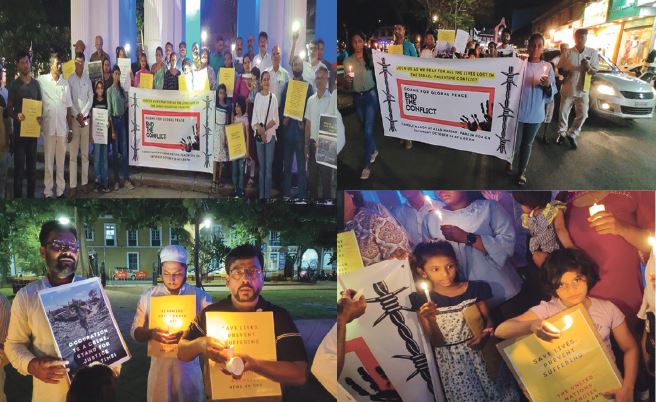PANAJI STANDS IN SOLADARITY: An hour long candlelight march for Israel-Palestine peace was organized by Goans for Global Peace at Azad Maidan at 6.30pm on October 28, 2023. The march brought together many to express solidarity with victims of the on-going Israel-Palestine conflict. It was quiet march sending out a message of peace and unity from participants from all walks of life, transcending differences in backgrounds and perspectives. Goans for Global Peace is a non-political organization committed to promoting peace without taking sides in the conflict. About a 100 participants holding lit candles along the periphery of the maidan made for a beautiful and poignant scene, apart from providing an opportunity for the Goan community to express support for global peace as also foster togetherness amongst themselves. Advocate Prasenjeet Dhage was the convenor of the program and amongst speakers there were Praveen Gangurde, Savio Coutinho, Subhash Kerakar, Madhu Naik, Elvis Gomes, Asif Hussain. Various NGOs and not for profit Institutions participated in the event. Said Adv Prasenjeet Dhage, “The world suffers a lot not due to the violence of bad people but due to the silence of good people. We are neither supporting Israel nor Palestine, we are here for the victims of the conflict. The war has killed more than 7,000 people, we are here to pray for them. Mahatma Gandhi gave us powerful tools like satya and ahimsa we can use as tools to combat war and bring peace in the world. India under the principles of Gandhiji can teach the world to be peaceful.”
By Prasenjeet Dhage
The world continues to be traumatized by the perpetual tragedy of the Israel-Palestine conflict…
THE Israeli-Palestinian conflict is an ongoing military and political dispute in the Levant region (Syria, Lebanon, Israel, Palestine, Jordan and Cyprus). It dates back to the mid-20th century and centre around the conflict over territory between Israelis and Palestinians. When Goans For Global Peace in Panaji announced a Candle March on October 28, 2023 it was with the objective of sending out a resounding message of peace and unity in support of the victims of the Israel-Palestine conflict, the death toll stood at 5,000 civilians. We hoped the number would not rise. Unfortunately, today the number has increased to over 8,500.
Regardless of one’s stance on the Israel-Palestine conflict, the soaring death toll remains an inescapable tragedy that should not be ignored. War, in all its forms, is inherently destructive and devastating, causing immeasurable pain and suffering to countless innocent lives. It is a testament to the failure of diplomacy and the human cost of unresolved conflicts. The death toll is a sombre reminder that the consequences of war extend far beyond political and territorial disputes.
TOOTHLESS ORGANISATIONS
THE Paris Peace Conference held in 1919 aimed to restore global peace following World War I. Notably, Italy, France, the UK and the United States dominated the conference, and the defeated nations, including Germany, had no say in shaping the treaty. The Treaty of Versailles, a product of the conference, assigned blame for World War I to Germany and compelled the country to pay reparations to the Allied nations for the losses and damage incurred during the war. This treaty’s harsh terms were a significant contributing factor to the outbreak of World War II.
The League of Nations, formed in the aftermath of World War I, proved to be a grand failure as it couldn’t prevent World War II. Its limitations were among the reasons behind the British mandate over Palestine.
The United Nations, established after World War II, aimed to learn from the shortcomings of the League of Nations and work towards international peace and co-operation. There is a growing sense of frustration regarding the United Nations Security Council’s inability to respond. Once again, the Security Council has not taken action in the face of the Israel-Hamas conflict, even as the humanitarian crisis deepens in the Gaza Strip.
IN 1917, to secure Jewish backing for Britain’s engagement in World War I, the Balfour Declaration was issued, committing to the establishment of a Jewish national homeland in the region of Palestine, then under Ottoman rule.



Throughout the early 20th century, Britain held a mandate over Palestine, as sanctioned by the League of Nations. The British administration grappled with a multitude of complex challenges during their tenure and implemented several policies that carried enduring consequences.
Britain played a significant role in shaping the Israeli-Palestinian conflict. British policies, such as the Balfour Declaration of 1917, which expressed support for the establishment of a Jewish homeland in Palestine, contributed to the displacement and dispossession of the Palestinian people. Additionally, the British administration faced criticism for its handling of the situation, including issues such as land ownership, immigration and the Arab-Jewish tensions in the region.
The Holocaust exerted a significant influence on the Palestinian situation. Throughout the duration of the Second World War spanning from 1939 to 1945, the British authorities imposed stringent restrictions on the admission of European Jews fleeing the Nazi persecution into Palestine. Motivated by the desire to maintain favorable relations with Egypt and the oil-rich Saudi region, the British administration imposed immigration quotas on Jewish refugees.
This policy precipitated a deeply emotional and urgent reaction within the Jewish community, ultimately leading to a growing tide of armed resistance. As time passed, it became evident that the situation was fostering a convergence between two distinct groups: one sought British assistance in realising their aspirations for a national homeland (embodied by the Haganah), while the other, driven by desperation, endorsed the use of extreme tactics, including terrorism, to oust the British authorities from the region.
Yet, even in the face of decades passed by, the British government has remained conspicuously unapologetic, evading any meaningful reckoning with the moral responsibility it bears for the consequences of its past actions. The wounds of history persist, echoing with unmet calls for reconciliation and acknowledgment.

